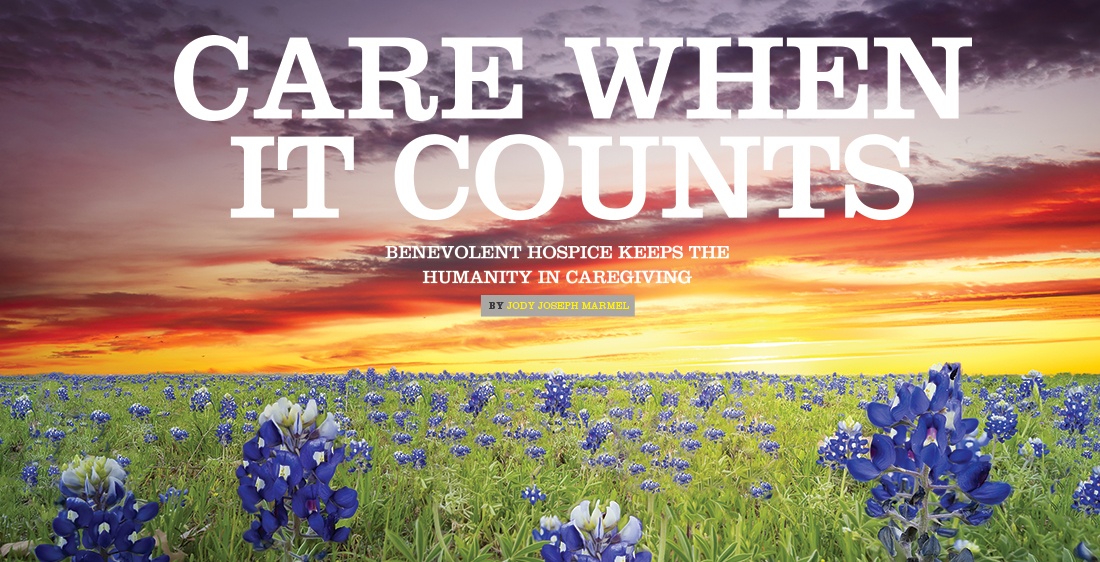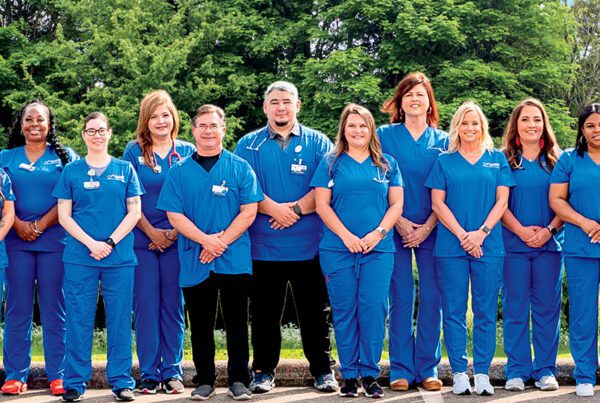When people hear the word “hospice,” most patients and their loved ones think of imminent death. But this is not the case, according to Xiomara Allen, co-founder of Benevolent Hospice. “If a patient is given six months to live, they are eligible for hospice services, which help them deal with the ending stages of life on an emotional, psychological, physical and spiritual level,” shares Xiomara.
Patients do not have to wait until their physicians diagnose them with “a few weeks to live.” This is a major misconception in healthcare, and founder James F. Thomas Jr. and co-founder Xiomara Allen are doing their best at re-educating the public throughout Texas. While hospice is synonymous with morbidity, Benevolent Hospice is trying to eliminate the word morbid from the entire process. With their compassion, strong beliefs, taking active roles in their communities via education and quality care, this team is on a mission.
“We did not want to be a part of a system where profit is over patient care, instead of patient care being over profit”– Benevolent Hospice Co-Founder Xiomara Allen
The idea and concept of Benevolent Hospice is to bring patient care to the forefront of hospice, while eliminating the bureaucratic systems that exist in corporate business practices. Benevolent’s co-founder explains, “We did not want to be a part of a system where profit is over patient care, instead of patient care being over profit.” The Benevolent Hospice LLC mission is to provide an accessible, effective, and efficient hospice service that is beneficial and responsive to San Antonio and surrounding communities’ residents with terminal illnesses.
“As a hospice provider service, we will provide a non-curative, peaceful, comfortable, dying experience for the individuals and his or her family,” says Xiomara.
Benevolent Hospice opened in November of 2009 in San Antonio from the garage of their house that was converted into an office space. Benevolent’s founder and co-founder orchestrated the everyday matters of caring for patients and running an office out of their home location for approximately nine months before they relocated to a small office space located off of Grissom Road. “We stayed in this location for numerous reasons,” recounts Xiomara. “Affordability was essential, and then three years later, we moved to our current location in Helotes, Texas.”

The Benevolent of Houston branch opened in February of 2012, and their office is located in Stafford, Texas. Keeping affordability as a part of the business model was crucial in order to make Benevolent into the patient-centric model they have crafted and continue to follow to this day.
The driving force behind the concept of Benevolent Hospice was the experience of James F. Thomas Jr. after losing both a close friend and a newborn son while on hospice care. Benevolent’s founder was in medical school when his friend was diagnosed with AIDS and went into hospice. “What I saw — parts of it I loved, and there were parts I could not stand…I volunteered for the San Antonio AIDS Foundation and did whatever I could to be proactive and make some kind of impact. What I knew as a fact, the way hospice was treating patients had to be changed,” shares the Benevolent founder.
While James was still in medical school, his son was born prematurely, and while he survived birth, he had an E.coli infection to the blood. Weeks later, he died, and it was a turning point for James. Instead of completing medical school, he went to the healthcare science administration program and wanted to make a difference in hospice care.
He opened up five hospice centers for the company he was working for at the time. James felt he was making a positive impact, but as soon as the hospices were up and running, “they started doing exactly what I did not want. It was all about profit over patient.” He details, “I was getting more frustrated with the system because I really care about what I do, and I knew that I needed to be the one to make a difference.”
The hospice care that James experienced for his friend and son was impersonal, and the workers were not very compassionate. As a current hospice executive, this was not an acceptable practice toward the patient and family that was present. By experiencing both sides, it was apparent that the original concept of hospice was lost, and this became the motivation for Benevolent Hospice.
“I was getting more frustrated with the system because I really care about what I do, and I knew that I needed to be the one to make a difference”– Benevolent Hospice Founder James F. Thomas Jr.
The Benevolent Hospice philosophy is to provide patients, and their families, relief from physical, spiritual and emotional pain at the end of life. “We believe in creating an environment permeated with compassion, unconditional acceptance and professional competence,” says Xiomara proudly.
The cutting-edge of Benevolent Hospice is performing palliative care, and truly performing palliative care. Benevolent’s co-founder adds, “A lot of hospice agencies within the community state and advertise they are palliative care, but they are not practicing palliative care.”
Both of Benevolent Hospice’s companies are accredited through Joint Commission and are veteran- and family-owned. What does Joint Commission mean to those in the health field?
It means an agency went through the most scrutiny in order to obtain their accreditation; Benevolent Hospice is accredited the same as a hospital.

Benevolent Hospice uses a family-oriented approach that includes a team of doctors, nurses, social workers, counselors and trained volunteers. “Our team works together focusing on the patient’s needs — physical, psychological or spiritual. The goal is to help keep the patient as pain-free as possible with loved ones nearby. Our team develops a care plan that meets each patient’s individual needs for pain management and symptom control,” says Xiomara, adding that the, “emphasis is on care of physical symptoms and other problems associated with terminal illness, rather than on cure of disease. Priority is given to the symptom control for the patients and the supportive care for both the patient and the family members.”
There are four levels of care that patients are entitled to while on hospice services:
“Our advice is to always research the hospice you are selecting. Not all hospices are the same. ‘Accreditation’ is very important. The difference between hospices are very easy to distinguish. If the hospice doesn’t have a gold seal ‘Joint Commission’ accreditation, it is limited in the services available to your family,” explains Benevolent’s co-founder.
Based on recent changes to the federal guidelines, the government is pushing hospices to become corporate. What does this mean?
“Our patients’ journeys are our journeys too” – Benevolent Hospice Co-Founder Xiomara Allen
“Profit over patient care! It is not about ensuring your patients receive the highest quality of care possible. It is about reducing cost associated with providing services to your patients. It’s about ensuring they pass in six months. That is why it is extremely important you select a hospice which is accredited as a palliative care hospice. This will allow your family and loved ones the best opportunity to live a fulfilled life through these times,” states Benevolent’s co-founder.
Benevolent Hospice’s founder and co-founder will continue to make their mission patient- and family-oriented as they continue to grow throughout the state. “Our patients’ journeys are our journeys too. We take great pride in ushering our patients and their loved ones on this path. Our greatest joy is augmenting our families,” shares Xiomara proudly.
After speaking with both James and Xiomara, hearing their stories, and their genuine concern for all of their patients and their families, it is apparent that Benevolent Hospice truly cares about the entire journey from beginning to end.
I noted on Xiomara’s email an apropos quote she uses and I want to share that with you. “I’ve learned people will forget what you said, people will forget what you did, but people will never forget how you made them feel,” said Maya Angelou. And under Xiomara and James’ guide, Benevolent Hospice is destined to make a lasting impact on their patients, families and the community at large.







Recent Comments